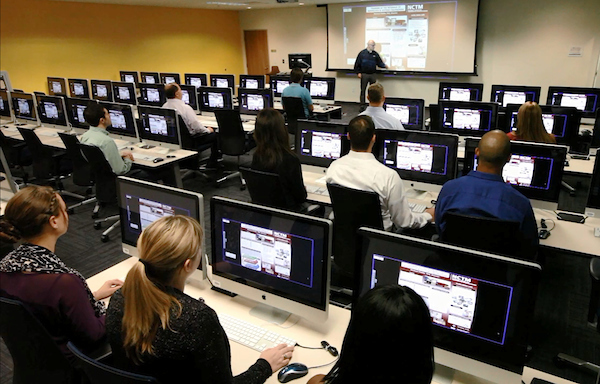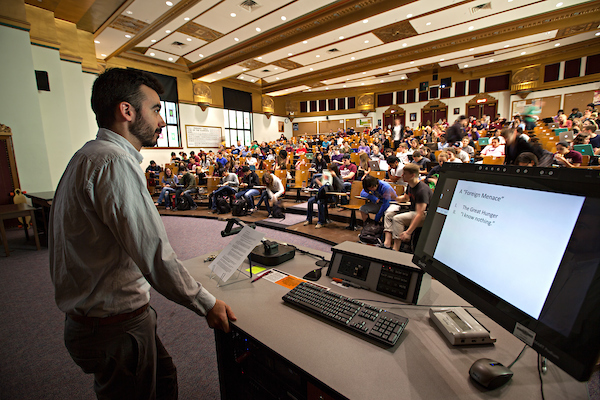Rationale
A faculty task force to investigate best practices regarding APT faculty included recommendations for APT faculty professional development:
- APT faculty create and annually update an individual strategic plan that includes goals for professional learning and advancement.
- A menu of professional development opportunities (e.g., mentoring, co-teaching, workshops, collaborations, conferences and faculty learning communities) are available to APT faculty.
- Departmental leadership is supportive of APT faculty participation in a wide variety of professional development opportunities.
APT to Lead is designed with these recommendations in mind.
Approach: Faculty Learning Communities Plus Appreciative Inquiry
Well-designed faculty learning communities (FLCs) engage participants in focused professional development and provide opportunities to practice transferable leadership, peer mentoring and community-building competence.
With APT to Lead, participants will explore how to thrive as faculty members using Appreciative Inquiry (AI), a positively oriented framework for planning that builds on strengths. Appreciatiave Inquiry begins with inquiry into the best of what is, imagines what could be, considers obstacles and moves toward a motivating design for future.
Faculty accepted into this program commit to:
- Preparing for and participating in eight facilitated interactive Appreciative Inquiry work sessions to produce a high quality draft of an individual strategic plan for the APT leader (12 - 3 p.m. across the indicated Fridays in the 2024 Spring semester).
- Jan 26
- Feb 2
- Feb 16
- Mar 1
- Mar 22
- Apr 5
- Apr 19
- May 3
- Finalizing their individual strategic plan and sharing it with department leadership (Summer 2024)
- Participating in a follow-up interview (Spring 2025).
This program is offered via hybrid delivery to facilitate participation by faculty from our branch campuses. We expect College Station faculty to participate in-person. Lunches will be provided for those attending in-person.
Individual Strategic Plan
Participation in work session activities and discussions will facilitate holistic self-evaluation and composition of a well-elaborated individual strategic plan including:
- Vision Statement
- Mission Statement
- Core Goals
- Action Plans
- Long term goals
This plan spans all aspects and relationships in the life of the faculty member. Further, an integral aspect of this plan is excavating the unique value the APT faculty member brings as well as the factors with potential to either enable or erode faculty member success.
Program Outcomes
- Practice the skills essential for collegiality and leadership (e.g. active listening, constructive dialogue, strength appreciation, growth mindset, team-building).
- Learn the language and concepts associated with leadership roles in academia.
- Cultivate the agency of individual faculty to constructively confront challenges, seek necessary development and practice resilience.
- Establish a cohort of support.
- Promote meaningful and productive communication among APT faculty and their leadership.
- Encourage relationships with leadership in Faculty Affairs.
- Identify systemic barriers for APT faculty common among participants, allowing for design of proactive institutional measures, and proactive and timely faculty development opportunities for APT faculty.
Eligibility
The 2024 APT to Lead community will accept up to 24 full-time APT faculty who are in a titled leadership position or have received one promotion, and have been at Texas A&M University for five years.
Facilitators
- Nancy Simpson, retired clinical professor, Mays Business School, certified Appreciative Inquiry Facilitator and certified Clifton Strengths Coach.
- Heather Wilkinson, associate vice president for Faculty Affairs and professor of Plant Pathology and Microbiology, trained Appreciative Inquiry Facilitator, certified Clifton Strengths Coach, certified in Conflict and Change Management with the Thomas-Kilmann Instrument, and trained Co-Active Coach in pursuit of ICF Certification.
Selection Process
Applications will open November 27, 2023, and close December 22, 2023. Participant selections will be communicated no later than January 5, 2024.
The application requirements include some general information about the faculty member and a short description of how they predict their participation in the opportunity will be meaningful for them and others in the cohort. In addition, the applicant should request that the department head send an email to facultydevelopment@tamu.edu in which the department head conveys both approval for participation by the faculty member and the ways in which they expect the experience will be beneficial.



